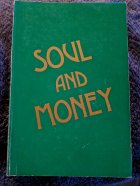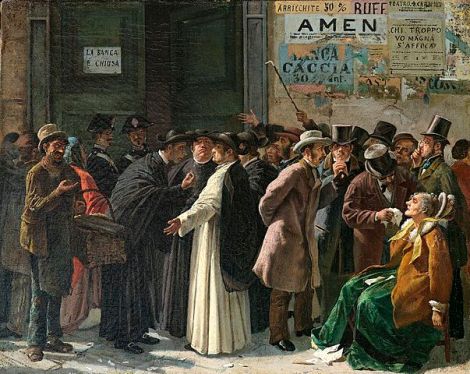 It’s easy to see how the capitalism of an economy structures the dynamics between people and sociopolitical relationships within a culture, particularly with an emphasis on people and resources in service of production and economic growth, rather than an economy in service of the people. When understood as one of the dynamics driving, not only outer relationships, but inner realms as well, we might wonder in what ways the economy shapes our notions of self and other.
It’s easy to see how the capitalism of an economy structures the dynamics between people and sociopolitical relationships within a culture, particularly with an emphasis on people and resources in service of production and economic growth, rather than an economy in service of the people. When understood as one of the dynamics driving, not only outer relationships, but inner realms as well, we might wonder in what ways the economy shapes our notions of self and other.
As the exchange of money drives such a large part of how we survive, giving access to all of the necessities to sustain one’s existence, does it not also permeate our identities by requiring a response to one’s relationship to the economic cultural norms? For what facet of life remains untouched by the economic system that we have so little choice but to “buy in to?” Doesn’t the agreement that “nothing is free” now demand that we participate in the scheme as producers, but not of the goods themselves, but of the economy?
No longer do we work in service of the necessities that sustain us, but in service of money itself and the myriad, abstract forms of goods in exchange. Credit, insurance, stock market, loans, investments are hardly, if ever associated directly with the goods, but have also become things to purchase. The goods and services that we purchase have become in some sense, secondary, reliant on affording and financing their ownership. They are the reward, or prize, granted us for our buying in to the system. The gratification of ownership must draw us in for the economy to “work.”
James Hillman, in his essay, A Contribution to Soul and Money,” likens the psychology of money to the sea, “deep and broad as the ocean, the primordial unconscious…” where it “…makes us so.”
Money is as protean as the sea-God himself…
Money is like the id itself, the primordially repressed, the collective unconscious appearing in specific denominations, that is, precise quanta or configurations of value, i.e., images. Moneys are the riches of Pluto in which Hades’ psychic images lie concealed. To find imagination in yourself or a patient, turn to money behaviors and fantasies. You both will soon be in the underworld (the entrance to which requires a money for Charon).*
 If money takes us deep into the underworld, and we live, as Hillman also believed, by an economically driven myth, who are we in the story? As I write this essay, I am struck not only by how readily economically flavored language and metaphor appear, but how these same terms have gained currency in other facets of life. In particular, the idea of ownership is not only an economic term, but a psychological one. The word has a curious history relating to the word, possession:
If money takes us deep into the underworld, and we live, as Hillman also believed, by an economically driven myth, who are we in the story? As I write this essay, I am struck not only by how readily economically flavored language and metaphor appear, but how these same terms have gained currency in other facets of life. In particular, the idea of ownership is not only an economic term, but a psychological one. The word has a curious history relating to the word, possession:
c. 1200, ouen, “to possess, have; rule, be in command of, have authority over;” from Old English geagnian, from root agan “to have, to own” (see owe), and in part from the adjective own (q.v.). It became obsolete after c. 1300, but was revived early 17c., in part as a back-formation of owner (mid-14c.), which continued. From c. 1300 as “to acknowledge, admit as a fact,” said especially of things to one’s disadvantage. To own up “make full confession” is from 1853. Related: Owned; owning.
 In an earlier time, it’s likely that there wasn’t enough “ownership,” in the way of personal property, for the term to be used in an economic context. That the connotation was negative shows how the idea has transformed over time as the modern myth of economy took root. The word “economy” relates to the idea of household and thrift which also saw an expanded usage in the 17th century as something applicable to the State.
In an earlier time, it’s likely that there wasn’t enough “ownership,” in the way of personal property, for the term to be used in an economic context. That the connotation was negative shows how the idea has transformed over time as the modern myth of economy took root. The word “economy” relates to the idea of household and thrift which also saw an expanded usage in the 17th century as something applicable to the State.
What’s curious to me is the correlation between the emphasis of an idea that we might take for granted; that of the self as individual, separate, unique and free – as in not belonging to an other – as outcomes of the construct of an economy; its language, ideas and functionality, both of which have imposed upon us, a particular way of understanding the nature of the individual in economic terms. But which shall we say came first? Is this a chicken and egg situation? Perhaps.
I tend to think that the change in a style of consciousness was the catalyst that allowed for increasingly abstract ways of thinking about power and potential, in which the combination of the ideas of growth, separation and expansion, took hold of the modern psyche. But in this instance, the particular change in a style of consciousness is the move away from a polytheistic world where the gods’ and nature’s power once controlled and determined our fate, towards a monotheistic world, where the gods of old have been supplanted by an increasingly transcendent God. As God transcends, power shifts back to earth, embedded in the hopes and dreams that rational science provides.
The problem with growth and expansion appear if we then begin to mistake the means as the goal. Instead of an economy with soul, where value resides in what brings beauty to life, growth and expansion make a psychological claim on us, where it can be seen to reflect an underlying dynamic of the need for increasing power and control over individual destiny. This shift not only enhances the sense of oneself as distinct and separate, and therefore accountable, but through a hierarchical dynamic tends to reward those who adapt to the shift.

Those who adapt, learn to live by the metaphors of ownership and possession, where individuality as the core idea, shapes modern identity. It’s infectious, as all ideas are that seem to bring about immediate reward and gratification. Once the psychological shift infiltrates the collective, technology, as the means to increased survival and comfort, furthers the rewards of personal identity, as our value and identity begins to merge with what we own. But as well, as individuals, the culpability for one’s behavior, choices and possessions increases the need for protection through yet another purchase: insurance.
This dynamic is still very much in play as we moderns now argue over who is responsible for both personal and collective messes we find ourselves in. Ironically, through the successes of technology, abstracted into a love of money for its own sake, the goal becomes the assurance of means, rather than in the value of the things themselves. Here we finally see money completely devoid of both soul and value.
Perhaps the more that money itself loses soul – devalued and devoid of a connection to the divine – the more its use is corrupted, in the same way that amassing a mountain of things, deflate both their value and meaning. I agree with Hillman, who sees that it is not money itself that is the problem, but the loss of its connection to soul and value, as can often be witnessed through one’s relationship to money.
As long as our belief system inherently depreciates money, it will always threaten the soul with value distortions. Depressions, inflation, bad credit, low interest – these psychological metaphors have hardened into unconscious economic jargon. Having “de-based” money from its archetypal foundations in psychic reality, money attempts a new literal and secular foundation for itself as “the bottom line.” But this bottom does not hold, because any psychic reality that has been fundamentally depreciated must become symptomatic, ‘go crazy,’ in order to assert its fundamental archetypal autonomy.
In conclusion, I would add that the ways in which culture structures itself, readily seen in the shared public places of commerce and the daily grind of our personal routines, reflect back to us the nature of a shared psychic reality. As the structures in place appear to tumble into chaos, and we feel our discontent mount, perhaps some shift within us calls more deeply to find value in the hidden beauty, as a pearl residing both within ourselves and in others.
*Un less otherwise noted, all quotes: James Hillman, Soul and Money Spring Publications

A problem that was expressed quite sometime ago by:
Matthew 22:21 Jesus said “Render to Caesar the things that are Caesar’s; and to God the things that are God’s.”
We should not confuse the means, to our goal, and to be aware that anything not belonging to Self, its of little importance to who we really are, not ephemeral ego, but Spirit.
Very nice, thank you. 🙂
LikeLiked by 1 person